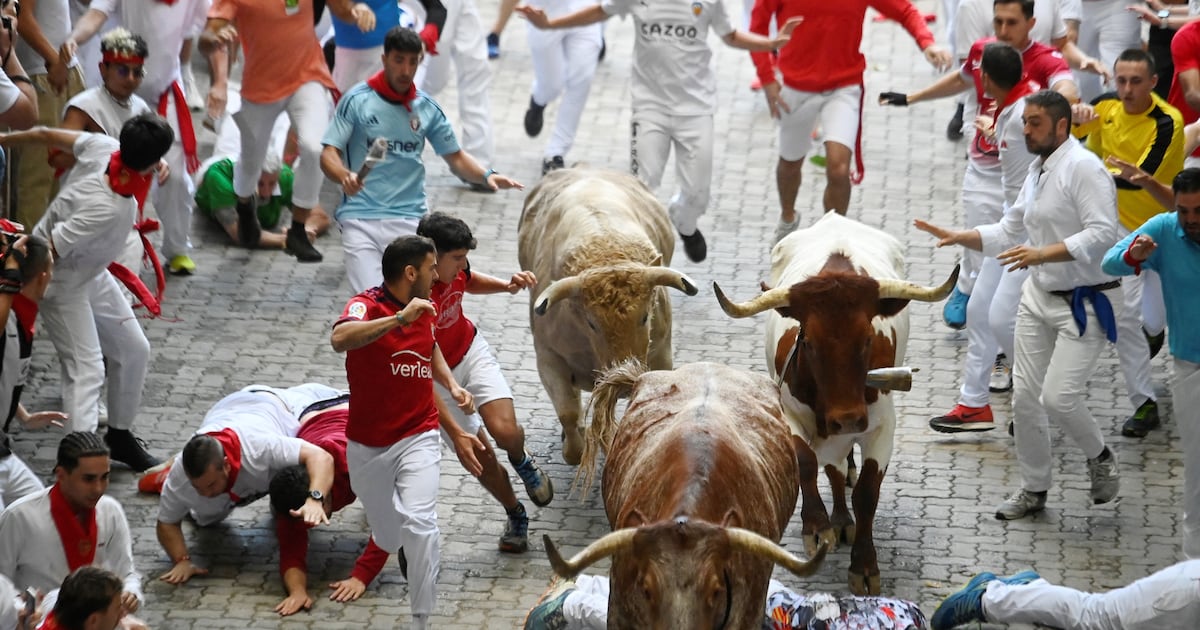World
Bullfighting in Spain’s Basque Country Faces Growing Opposition

The future of bullfighting in Spain’s Basque Country is being challenged amid a rising tide of animal rights protests and political debates. This summer, demonstrations intensified against bullfighting traditions, particularly in cities like Bilbao and San Sebastián, where bullfighting festivals have long been a staple of local culture. Significant opposition has emerged, with protesters vocalizing their discontent outside bullrings during events, signaling a shift in public sentiment.
Protests reached a peak during the Aste Nagusia festival in Bilbao last month, coinciding with bullfights. Demonstrators chanted slogans such as “Torture is not culture” and “No tradition above reason,” reflecting a growing movement against animal cruelty. This year’s protests attracted larger crowds than in previous years, indicating that opposition is gaining momentum.
The controversy surrounding bullfighting extends beyond public demonstrations. Some public transport workers in Bilbao expressed their objections to advertisements promoting bullfighting on trams, stating that such promotions are inconsistent with societal values. The LAB workers’ union articulated their stance, emphasizing that “numerous studies show that the majority – particularly young people and working people – reject these practices.”
According to a recent poll conducted by the BBVA Foundation, the union’s claims resonate with broader public opinion: 77 percent of Spaniards oppose using animals for bullfighting, and 85 percent disapprove of their use in local festivities, such as bull-running events.
The growing influence of animal rights activists is also evident in the Asto Probak festival in Leioa, near Bilbao, where donkeys have faced criticism for being forced to drag heavy slabs through the streets. Protests were also noted in San Sebastián as its bullfighting season commenced, underscoring the widespread discontent.
Political implications of the bullfighting debate have emerged, with parties taking varied stances. The left-wing pro-independence coalition EH Bildu has called for discussions regarding the future of bullfighting in Bilbao. Previously, when EH Bildu held control of the city hall from 2012 to 2015, it implemented a ban on the practice, which was later lifted by the succeeding administration. The coalition, now in opposition, argues that the dwindling attendance at bullfights this year illustrates a public desire for change. Approximately 12,000 spectators attended the final bullfight during the festival, while the bullring has a capacity of 14,000.
In response, the center-right Basque Nationalist Party (PNV), which currently governs Bilbao, acknowledges the calls for a new ban but contends that such a discussion should extend beyond local governance. Joséba Díez Antxustegi, the PNV’s spokesman in the Basque parliament, criticized EH Bildu for perceived hypocrisy, pointing out that in areas where they govern, bullfighting remains popular, suggesting a disconnect in their opposition.
The situation is particularly complex for EH Bildu in Pamplona, where it oversees the city hall. The San Fermín festival, renowned for its bullfights, is a highlight of the cultural calendar. Mayor Joséba Asirón attended one of the bullfights this year, facing backlash from attendees who disapproved of his coalition’s politics. Asirón has been cautious regarding discussions about banning bullfights, asserting that the festival should reflect the desires of the people of Pamplona.
In his comments ahead of the festivities, he stated, “The San Fermín festival is and always will be what the people of Pamplona want, and nobody is going to introduce a ban just with a decree or the stroke of a pen.” He did emphasize the necessity for dialogue regarding the festival’s components, indicating that city hall is conducting a comprehensive survey to gauge public attitudes toward bullfighting and bull-running.
Resistance to altering these traditions remains robust, particularly from conservative factions. In Madrid, some regional governments have actively supported and subsidized bullfighting events. Cristina Ibarrola, a member of the conservative Union of Navarran People (UPN), highlighted the cultural significance of bullfighting, stating, “There has to be a scrupulous respect for the religious sentiment of the festival, and bullfights and bull-running are what make these fiestas internationally known.”
The economic implications of the San Fermín festival are substantial, with an estimated revenue of €163 million generated in 2022, despite lingering effects from the Covid-19 pandemic. As the debate over bullfighting continues, the struggle between tradition and evolving societal values remains at the forefront of public discourse in the Basque Country and beyond.
-

 Top Stories3 months ago
Top Stories3 months agoTributes Surge for 9-Year-Old Leon Briody After Cancer Battle
-

 Entertainment4 months ago
Entertainment4 months agoAimee Osbourne Joins Family for Emotional Tribute to Ozzy
-

 Politics4 months ago
Politics4 months agoDanny Healy-Rae Considers Complaint After Altercation with Garda
-

 Top Stories4 months ago
Top Stories4 months agoIreland Enjoys Summer Heat as Hurricane Erin Approaches Atlantic
-

 World5 months ago
World5 months agoHawaii Commemorates 80 Years Since Hiroshima Bombing with Ceremony
-

 Top Stories3 months ago
Top Stories3 months agoNewcastle West Woman Patricia Foley Found Safe After Urgent Search
-

 Top Stories5 months ago
Top Stories5 months agoFianna Fáil TDs Urgently Consider Maire Geoghegan-Quinn for Presidency
-

 World5 months ago
World5 months agoCouple Convicted of Murdering Two-Year-Old Grandson in Wales
-

 World5 months ago
World5 months agoGaza Aid Distribution Tragedy: 20 Killed Amid Ongoing Violence
-

 World5 months ago
World5 months agoAristocrat Constance Marten and Partner Convicted of Infant Murder
-

 Top Stories4 months ago
Top Stories4 months agoClimbing Errigal: A Must-Do Summer Adventure in Donegal
-

 Top Stories4 months ago
Top Stories4 months agoHike Donegal’s Errigal Mountain NOW for Unforgettable Summer Views









